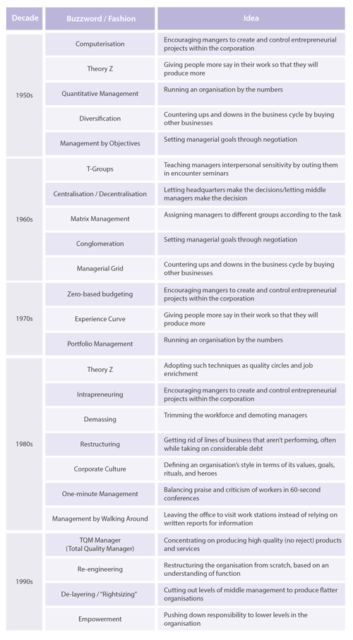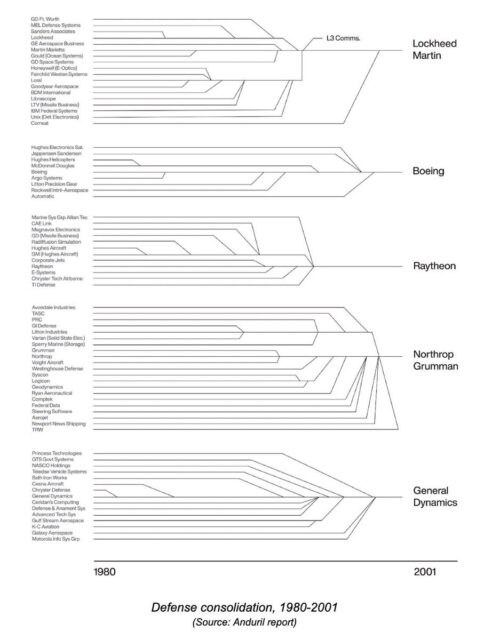No, I’m not sure if that headline makes any sense, as I was never particularly receptive to the latest buzzwords of any given management fad that went through from the 70s onwards. They all seemed to share a few characteristics along with a bespoke sheaf of buzzwords, PowerPoint slides galore, and lots of spendy courses you had to send all your employees to endure. Is there anything more dispiriting to staff morale than a VP or director who’s just returned from a week-long training seminar in an exotic location on this year’s latest “revolutionary” “transformational” management fad?
It’s bad when companies that make widgets or smartphone apps or personal hygiene products fall for these scams, but it’s terrifying to discover that your military isn’t immune … and in fact revel in it:

Image from “Fads and Fashions in Management”, The European Business Review, 2015-07-20.
https://www.europeanbusinessreview.com/fads-and-fashions-in-management/
We spent these last few decades since the fall of the Soviet Union weaving a comfortable web of CONOPS and implemented “efficiencies” constructed of consultant-speak, weekend-MBA jargon, and green eyeshade easy-buttons bluffed from the podium by The Smartest People in the Room™ to an audience on balance populated by people who already had the short list of jobs they wanted once they shrugged off their uniform in a PCS cycle or two.
Agree, endorse, parrot, prepare …. profit!
War is New™!, Revolutionary™!, Transformational™!. Hard power is Offset™! If we change a bunch of simple words in to multi-syllabic cute acronyms … then the future will be ours, our budgets will be manageable, and our board seats will be secured! Efficiency to eleventy!
Facing the People’s Republic of China on the other side of the International Date Line … how efficient do you feel? How effective?
Something very predictable happened in our quarter century roadtrip on the way to Tomorrowland; we realized instead we wound up on Mr. Toad’s Wild Ride instead.
I would like the record to show here in 2QFY24 that this exact problem was discussed in detail back when I was a JO in the mid-1990. This is not shocking to anyone who is wearing the uniform of a GOFO. They lived the same history I did.
We knew we were living a lie that we could sustain a big fight at sea. An entire generation of Flag Officers led this lie in the open and ordered everyone else to smile through it. Ignore your professional instincts, and trust The Smartest People in the Room™.
Once again, Megan Eckstein brings it home;
If U.S. military planners’ worst-case scenario arose in the Pacific — having to defend Taiwan from a Chinese invasion — American military forces would target Chinese amphibious ships.
Without them, according to Mark Cancian, who ran a 2022 wargame for the Center for Strategic and International Studies that examined this exact scenario, China couldn’t invade the neighboring island.
…
U.S. submarines would “rapidly fire everything they have” at the multitude of targets, Cancian said, “using up torpedoes at a much, much higher rate than the U.S. has expected to do in the past.”
Navy jets, too, would join in — but they’d run out of Long Range Anti-Ship Missiles within days, …
It’s this nightmare scenario that’s driving the Navy to increase its stockpile of key munitions: the LRASM, the MK 48 heavyweight torpedo, the Standard Missile weapons and the Maritime Strike Tomahawk, among others.
Over a decade after the Pacific Pivot, a couple of years after the US Navy became the world’s second largest navy after being the worlds largest for living memory of 99% of Americans, and two years after the Russo-Ukrainian War reminded everyone that, yeah … 3-days wars usually aren’t.
And the defence industries of the 1980s and 90s have all swallowed up smaller competitors — again following “normal” business practices of the time, seeking economies of scale and manufacturing efficiencies and closing down less-profitable assembly lines or entire lines of business.
Let’s go back to SECDEF Perry’s 1990s “Last Supper”, you know, the one that was all about the efficiencies of consolidation of the defense industry.
Three decades later, what is the solution to the strategic risk we find ourselves in due to our inability to arm ourselves?
… “the bottleneck is rocket motors” because so few companies are qualified to build them for the United States, Okano explained. To help, the Navy issued a handful of other transaction agreement contracts to small companies who will learn to build the Mk 72 booster and the Mk 104 dual-thrust rocket motor so prime contractors have more qualified vendors to work with, she added.
LOLOLOL … what “small companies?” That ecosystem is “old think”. If we need to go back to that structure, that will take decades not just to build, but decades of a viable demand signal.
Looks like we have started that as “small companies” perhaps repurpose part of their company to a military division. If we can just stop them from being gobbled up by the primes, it might be nice to return to a more robust, competitive ecosystem. Soviet-like consolidation and McNamaraesque efficiencies got us here, perhaps time to try something old as new again.
Nothing is less efficient to go to war with than a military designed for an efficient peace.






